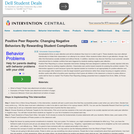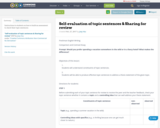
Some students thrive on peer attention-and will do whatever they have to in order to get it. These students may even attempt intentionally to irritate their classmates in an attempt to be noticed. When students bother others to get attention, though, they often find themselves socially isolated and without friends. In addition, teachers may discover that they must surrender valuable instructional time to mediate conflicts that were triggered by students seeking negative peer attention.
Positive Peer Reporting is a clever classwide intervention strategy that was designed to address the socially rejected child who disrupts the class by seeking negative attention. Classmates earn points toward rewards for praising the problem student. The intervention appears to work because it gives the rejected student an incentive to act appropriately for positive attention and also encourages other students to note the target student's good behaviors rather than simply focusing on negative actions. Another useful side effect of positive peer reporting is that it gives all children in the classroom a chance to praise others-a useful skill for them to master! The Positive Peer Reporting strategy presented here is adapted from Ervin, Miller, & Friman (1996).
- Subject:
- Education
- Material Type:
- Teaching/Learning Strategy
- Provider:
- Intervention Central
- Author:
- Jim Wright
- Date Added:
- 02/10/2014


